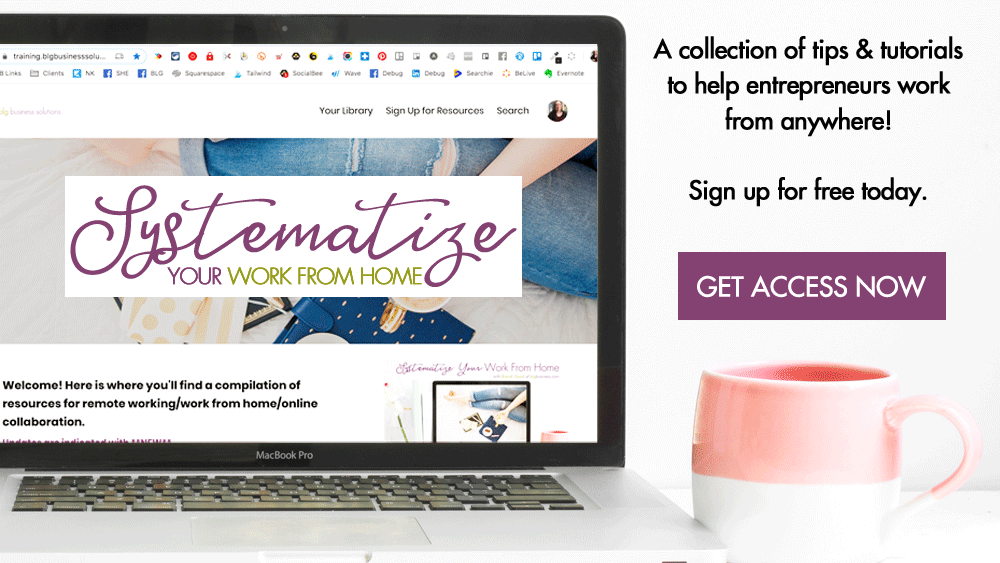LastPast Protects Your Business . . . and Also Your Clients and Team Members

How do you create passwords that you can remember and that are really secure? You can’t. Stop using passwords with your kid’s names, the street you live on, or your pet’s name over and over and protect your business from hacking. If your work requires you to share passwords with employees or contractors make sure you’ve done everything you can to help them protect your business. And if your work requires you to get passwords from your clients make sure you’ve done everything you can to protect their personal information.
Heads up! This post contains affiliate links, marked with an asterisk. If you sign up through one of those links you won't pay anything extra (sometimes you’ll even get a discount or bonus!), but I'll get a small commission or credit that helps me to keep delivering this awesome free content to you! I only recommend tools that I use and trust. Read my affiliate disclosure here.
In a mastermind group I’m in someone was complaining about the number of passwords they had to keep track of. They said almost 50. I nearly fell out of my chair laughing. “How about almost 500?” With LastPass* I really only need to remember 1 password now - the one to log into LastPass!
If you work with a team, or even a single VA or service provider who needs access to your accounts a password manager is a must have.
It doesn’t matter how much you trust people, every time you share your actual passwords you are at increasing risk. They might be the most trustworthy people alive, but what happens if they get hacked and they’ve saved your passwords in a big document or in their email account? Now the hackers have your info too.
On the flip side, if you are the service provider and your client is hacked now you have to worry about whether or not you are at fault, and even if you’re not, there could be an impression that you are anyway.
There is no 100% bulletproof way to protect yourself from hackers, fraud, and identity theft, but I feel more secure now and here’s why:
-
I let LastPass generate random passwords for me - so even I don’t know what my passwords are.
-
No password is used twice, so even if the account information is exposed to hackers on the web, I only need to worry about that one account (instead of changing a ton of passwords because I’ve used the same 3 passwords for all my accounts).
-
I can share account access with my team members without actually giving them the password (using/installing LastPass is a mandatory step of my onboarding process). Basically I share the login credentials with their LastPass account so they can use it to log in, but the password cannot be viewed. So even if they get hacked the hackers can’t see the passwords I’ve shared.
-
I can ask my clients to share passwords with me the same way as I share them with my team - and trust me, not knowing people’s passwords is a simple way to reduce stress. If they find themselves hacked I can be confident it wasn’t because of me.
-
Even if clients aren’t using LastPass I can store their info inside my account and then make sure to delete any other trace of it if they sent it via email or message.
So beyond feeling more secure about sharing passwords, here are some of my favourite LastPass features:
Passwords available on multiple devices - I have LastPass installed in my browser and the app installed on my phone - passwords are accessible on all of my devices.
Easy app access - I can use the built-in fingerprint or facial recognition feature on my phone to log in to the app. This is handy if you’re like me and not a fan of thumb typing on your phone screen.

Quick logins - if you have the browser extension installed, logins will usually fill in automatically when you go to a saved site. If you have a site that has multiple logins, you can click in the username or password field to get all of the login options to appear as a dropdown and click the one you need.
Easy add site logins - if you have the browser extension installed and you log in to a site you will be prompted to add it the username and password to your LastPass account. The link of the login page will also be saved.

Easy update logins - whenever you change a password for a site that was previously saved, LastPass will ask you if you also want to update the info in LastPass (and again, if you have multiple logins for that site you will be able to choose which one you want to update).
Warnings for duplicate passwords - this helped me out massively when I started using LastPass and wanted to make my accounts more secure. Whenever I had a site that used a password I’d already used somewhere else I would see a warning to remind me to change the password.
Autogenerate passwords - you can set the length and the types of characters in your password, or even make it seem like a word or phrase if that’s how you like to remember things.

Lots of security features - I won’t go into the details of all of these, but they are robust enough that I feel safe storing my sensitive info with LastPass. At this point if I get hacked it’s because I did something dumb, like reuse a password or log into something sensitive on public wifi or something like that.
LastPass* has a great free plan - try it out today!









